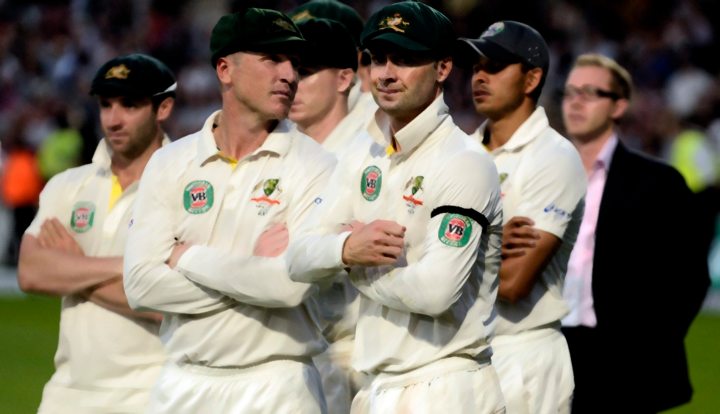Sport
Time to demand more from the ICC, for the good of cricket

Poor light dominated headlines throughout the Ashes and came to an emphatic climax when what was turning out to be an exciting end to a drab Test was cut short owing to poor visibility. It was a shame, but not a surprise. It’s time for everyone involved in the sport to demand more of the sport’s governing body, for the good of the game’s future. By ANTOINETTE MULLER.
The Ashes ended as a damp squib, which was consistent with the quality of cricket throughout the series. With Michael Clarke having boldly gone where no captain would have gone before, England was having a good go at chasing down a small total, but as the light began to fade, so did the chances of a result.
By 19:30, the light at The Oval had dimmed enough for the artificial light to take over. There were some issues with being able to see the ball, but all players seemed intent on carrying on. The crowd that had turned up wanted play to carry on. Those watching on TV wanted play to carry on. But as the umpires raised their light meters and the figures of 0.58 flickered on their screens, it was clear that there would be no thrilling end to what had turned out to be a thrilling Test match.
Whether play carries on or not is at the umpire’s discretion, and if they have previously set a precedent for when players are to go off, they cannot backtrack on this. The ICC playing regulations state that they are obliged to take the players from the field once the light has dropped to the level it was at when deemed unfit for play earlier in the match. Play had been halted earlier in The Oval Test due to bad light, so there was a standard the umpires had to adhere to.
Logic should prevail in such situations. However, how are umpires supposed to employ logic when the ICC has robbed them of that luxury?
When it comes to things like the Spirit of Cricket or fining coaches for showing disrespect, the ICC is quick to act, but that is meaningless if they cannot be bothered to act on more important matters.
Cricket has, in recent years, become an entertainment package. Test cricket, although tiresome for some, is one of the best forms of entertainment and it is subtly marketed as such by all and sundry. There is nothing wrong with that, but would you expect a movie theatre to cut a scene short right as the protagonist is about to defeat the villain?
As the governing body of the sport, it is up to the ICC to ensure its well-being. For Test cricket – and other cricket for that matter – to stay relevant, it needs to stay enthralling. That in itself is a near impossible aspect since very few Tests actually manage to achieve such an intense finish.
For the few games that do, though, should the rules be bent? And, if they are, who should decide on when they can be bent? For example, if England were eight or nine wickets down, would they still have been as eager to carry on? The frank answer is probably not. How does one then decide the flexibility and “logic” involved in allowing a game to carry on? Once a side has only the interest of not losing at heart, things could descend further into shambles through time-wasting. There really are issues with regards to seeing the red ball in artificial light which will do nothing but make players look foolish as they swing wildly or try to field something they cannot see.
That there is a need to relook at the rules became clear during The Ashes, and fans, players and administrators should demand more from the ICC, but how exactly do you solve a problem with so many variables?
One solution is to give control back to the players and allow them to decide whether they want to stay on the field or not. This solution is straight-forward, but leaving a decision like that up to a large group of people all with different interests at heart is somewhat foolish. Removing the “safety of players” aspect from the umpire’s discretion is another option. There has been not one instance in recent memory of players getting injured when the light had started to dim. The concern is understandable, but perhaps it is unnecessary.
Something also needs to be done about overrates. Both England and Australia have been slow, but with the interference of DRS and drinks breaks, there is an issue. But that makes another case for punishments for overrates being more severe. If a team is slacking, don’t just fine them, but also enforce a penalty by having a the culprit bowler removed from the field for an amount of time with no sub fielder allowed. Of course this is a rather harsh solution, but overrates have been on the decline for far too long with captains and players escaping scrutiny and punishment far too often. It’s not the sole reason for play dwindling on far beyond the scheduled hours of play, but it’s one of the biggest problems.
Another solution is to start play earlier, if it is possible and when overs have been lost. This is already the case in South Africa, but in England there is an issue with dew early on in the day. However, throughout most of the Ashes the sun had been shining and the field of play would have been fit and ready for play to start at least 30 minutes earlier when overs had been lost the previous day. It doesn’t even impact on the broadcasters that much since pre-match coverage starts at least an hour before play. Allowing room to manoeuvre around the hours of play, especially in crunch matches or when a whole day has been lost due to bad weather, is surely the most logical solution to a problem which is irksome to many.
The ICC has said that they have been discussing the bad light issue since the Manchester Test and there is a meeting in October when the issue will be raised and addressed once more. This was revealed during Sky’s Broadcast of the English domestic 40-over competition on Monday. Yet, once again, the ICC had not revealed that they were looking into the issue which had caused so much controversy. It is the responsibility of the sport’s governing body to address issue as they arise, especially important issues which directly affects the game.
It is vital that cricket boards and administrators as well as fans and players start demanding more from the ICC. Bad light, overrates and everything else which affects the sport as a spectacle needs to be addressed instead of pussy-footing around issues or masquerading governance in the form of fines dished out inconsistently. DM
Photo: Australia’s captain Michael Clarke (front R) reacts after the fifth Ashes cricket test match against England finished as a draw at the Oval cricket ground, London August 25, 2013. REUTERS/Philip Brown




















 Become an Insider
Become an Insider